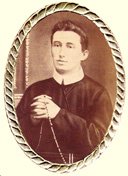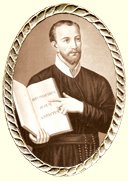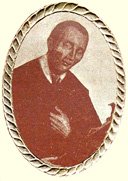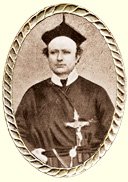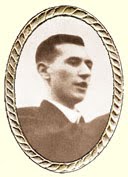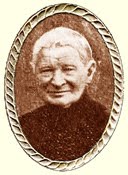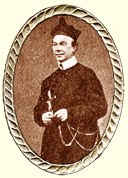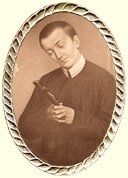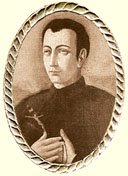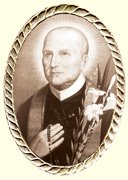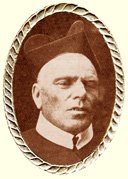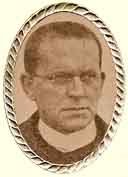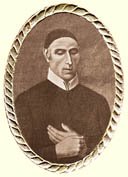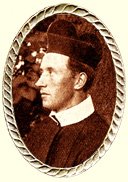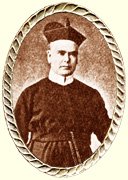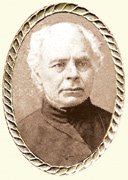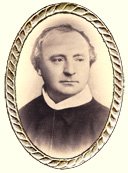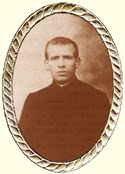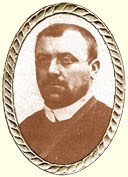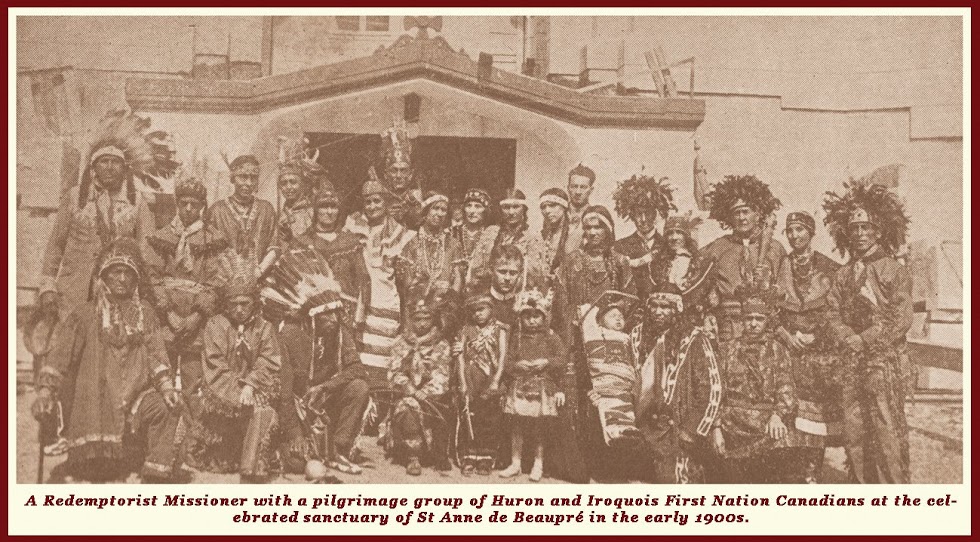Very Rev. Fr Michael Heilig, C.SS.R. (1808-1887)
As Local and Provincial Superior, Fr. Heilig had developed his vocation in different Provinces. A complete picture of his efficaciousness therefore could only be drawn up from the collected reports of those Provinces. These records are unfortunately not at our disposal. Hopefully, a more experienced pen will some day in the future produce for us a full biography of this so highly respected priest.
Fr. Michael Heilig was born on September 7, 1808, of Catholic and God-fearing parents in Winterbach in the Danube district of the Kingdom of Wurtemberg. From there his parents moved to Langenargen on Lake Constance. Here he spent his childhood with three brothers and three sisters, and learned the basics of the Latin language. He was always a cheerful boy, beloved by his playmates, but also respected. The school teacher of his town called his father’s attention to the talented son. It was decided to take the boy to the school in Ehingen, but he was not accepted there. A good student of his native country (who later became Fr. Tschenhens C.SS.R.) was helpful to the good parents and saw to it that their son was admitted to the College of the Jesuits in Freiburg, Switzerland. There he studied with distinction for seven years. Through frequent association with Redemptorists who had established themselves in Freiburg, he felt attracted very early on to the Redemptorist Order by the writings of St Alphonsus Ligouri.
The Jesuits would have liked to see this talented young man in their Order, but Heaven had other designs for Michael. He was destined to help advance and secure the interests of the Redemptorist Congregation in outstanding ways. The Order was at that time starting to spread north of the Alps - as the following summary of his eventful life will show.
In October, 1831, the twenty-three year old student travelled to Vienna and began his Novitiate in Weinhaus near Vienna in January, 1832. Then he was sent in September of the same year from Vienna to the House of Studies of the Congregation in Mautern, Austria. There he professed his vows on August 14, 1833. In April, 1834, he travelled from Vienna to Belgium by way of Innsbruck, Austria. Then, in September he went to St. Trond, Belgium, and there he taught Humanities, knowledge of which he had acquired to a preeminent degree. He could express himself in Latin with a certain eloquence as easily as in his mother tongue. Later, this ability was of great use to him, namely at the General Chapter in the year 1855, when he was named Secretary.
When the newly acquired monastery at Wittem, Belgium, was furnished in 1836, he settled there with some other professed clerics. On April 2 of the same year he was ordained a priest in Metz, and thereupon lectured on Moral Theology at Wittem for eight years. During this time he published a new, highly valued ten-volume edition of Moral Philosophy by St. Alphonsus. After he was Rector at Willem for three years, in 1848 he became Provincial of the Belgian Province, to which Holland, England, and North America also belonged.

In the following year, having been named Consultor General to Fr. Trapanese, he travelled to Nocera, Italy, where he remained until April 3, 1850. Then in December of the same year Fr. Heilig went to Rome where he was assigned as an assistant to the resident Vicar General in Coblenz, Germany, Fr. Smetana, and was named Superior of the house in Coblenz.
Here Fr. Heilig developed a very blessed activity. He was very beloved by the people, and had already started on the building of a monastery next to the church. Then in April, 1854, he had to travel with Fr. Smetana to Rome. In his position as Consultor General, Fr. Heilig participated in the General Chapter which was held in Rome in 1855. After the conclusion of the General Chapter he was assigned to the monastery in Luxemburg, where he spent four years as an ordinary member of the Order.
His superiors’ confidence in Fr. Heilig called him to Burtscheid, Germany, in October, 1859, where he became the Superior of the newly established house. Then he went in the same capacity to Aachen, Germany in 1862. There he remained in the office of Superior until the outbreak of the Kulturkampf in 1873, which caused him to settle in Vaals, Holland, along with several of his confreres. Under difficult conditions he again discharged the duties of the office of Superior for seven long years. In the year 1880 he was named Provincial and filled this important post again for another seven years in spite of his advanced age. Finally, the Rector Major removed him again to Vaals, where he concluded his life.
The particulars of his death are given in brief as follows.
On the evening of August 29, 1887, the community was about to begin priestly retreats. Fr. Zobel had travelled from Luxemburg to lead the exercises. The former Dutch Provincial, Fr. Oomen, who had always esteemed Fr. Heilig greatly, arrived in Vaals for a visit on this same day. Several days previously the afternoon had been designated as one of pilgrimage to Moresnet, near Vaals, and for a visit to the Franciscan Fathers there. Frs. Zopel, Oomen, Heilig, and the Rector of Vaals travelled after lunch to the beloved pilgrimage site of the Mother of God, prayed there before her image, looked over the new monastery, and then visited with the sons of St. Francis, who received and entertained their guests with great kindness. Then they drove back to Vaals. At the evening meal Fr. Heilig conversed most happily with the religious personages, who were to begin the spiritual exercises after the meal. He was quite cheerful at Recreation, prayed the evening prayers with the other priests, and then went to his cell.
Shortly after midnight he knocked on the wall of Fr. Rector, who was his neighbour and Confessor. He came quickly to Fr. Heilig’s side. “I’m dying,” said Fr. Heilig, who was seized by a shortness of breath. He sat half-upright in his bed. Fr. Rector quickly woke the next neighbouring priest, who called two more confreres, one of whom went for the doctor. When the doctor arrived, the ailing priest had already received the Last Rites. The doctor’s diagnosis was paralysis of the lungs.
Frs. Zobel and Oomen were awakened, and also stayed by the cherished confrere. Fr. Heilig retained consciousness until his last moment. He himself asked for the deathbed crucifix. Then he requested the Father Rector to inform his family of his death. He asked that His Excellency Father General be thanked for everything that he had received through the Congregation in which he had lived and which meant everything to him. “Now I have nothing more to say,” were his last words.
The Rector and the whole student body of Wittem, along with their Prefect, were present in the funeral procession. Also present were Fr Provincial Spoos, as well as several superiors from other monasteries. Fr. Zobel gave the funeral oration. Several acquaintances from Aachen were there, also a deputation of the youth congregation from Burtscheid where Fr. Heilig had been Director for many years. Many wreaths were laid on his grave in the cemetery in Vaals, where he rests next to his dear confreres Frs. Fey, von Held, and others, according to his cherished wish of many years. Requiem Masses for the departed were held in St. Alphonsus Church, in St. Michael’s Church in Burtscheid, in the Convent of the Sisters of the Poor Child Jesus, and in Marienthal near Wittem. For a very long time Masses were said for the repose of his soul.
Fr. Heilig was a born superior. Just three years after his Priestly Ordination he was named a Superior, and remained that for almost his whole life. For almost half a century he held offices of authority, obviously to the satisfaction of his superiors and of even the highest superiors. His humility in the presence of the clergy and everyone who came into contact with him was common knowledge. This humility was especially noticeable in the opposition and difficulties that confronted the foundation in Aachen. The building of the monastery there and the beautiful St. Alphonsus Church, which is visited preferentially by pious people, and is generally admired, is his work.
Furthermore, his work also includes the founding of the monastery in Vaals, which owed its establishment to the unholy Kulturkampf. “We built in despair,” Fr. Heilig often said later in jest when something about the building did not please all. And still more than its actual building, the monastery in Vaals owes its conservation to Fr. Heilig. Not long after its beginning, the monastery was threatened with destruction.
Pressure had been put on the Dutch administration to close the monasteries which had been built on the border by the exiled members of the Order from the Kulturkampf in Prussia. The monastery in Vaals was the first to be designated for destruction. That called for the complete determination and sagacity of one Fr. Heilig. With an ingenious pen he wrote to the Internuncio in the Hague, Mgr. Capri, as well as to His Excellency Fr. General in Rome, and through him to the Vatican Secretary of State Antonelli. In this way Fr. Heilig was successful in dispelling the dark fears and in averting the disaster of a voluntary move from the monastery in Vaals. In his great humility Fr. Heilig always said, “Only Our Mother of Perpetual Succour saved us.”
The Congregation owes much to Fr. Heilig. It was he who as a young priest accomplished the organization of Theological Studies in Wittem. Even today his plan for these studies endures and is followed faithfully. Four times he was present in Rome on important. As was previously mentioned, he performed the duties of a secretary at the General Chapter. He was a true son of St. Alphonsus; he lived only for the Redemptorist Congregation. He always took the great interest in its work, especially its propagation.
In his old age he often said, “If I were still young, I would gladly go to America.” For that reason the last great undertaking which he accomplished was the establishment of a new branch of the Order in Argentina. The Lower German Province was expected to undertake a foreign, overseas missionary field, just as a few other provinces of the Order had done. For this reason, he joyfully sent the first Redemptorists to Buenos Aires, and even accompanied them to the ship in Antwerp.
What was equally astonishing was the animated zeal with which he set up the advancement of scholastic studies and, generally speaking, the basic formation of the young clerics in Luxemburg. He was devoted to them with a paternal love, and thought of many joyful diversions for them during their vacations from study. As Provincial he took no less trouble to dedicate his whole attention to the Juvenate. The Juvenate had been started by his predecessor in the office, the late Fr. Schmitz. Fr. Heilig was expected to care for and cultivate the young sprouts of the promising plants, and he did that with a special liking. He loved the young people as if he were their real father. Whenever he came to the Juvenate in Vaals he delivered short speeches and conferences to the Juvenists, checked their assignments, and with the greatest interest was present at their examinations.
Furthermore, Fr. Heilig was also a much treasured confrere: esteemed because of his multi-faceted knowledge; appreciated because of his abundant experience; valued because of his particularly superior character. His already alluded to humility was such a part of him that one could say it was obvious everywhere he went. One never heard from him about what he himself had done, the various offices he had held, etc. He listened to everything in all humility - and in his relationship with people he didn’t always hear just praises. Even if many times his feelings were hurt, still he bore everything with calmness and patience.
On his part, he refused to hurt anyone. On the contrary, his whole consciousness and demeanour as a Redemptorist, and especially as an appointed office holder, suggested that he do his best for everyone, as much good as it was possible for him to do. Many of his confreres who, in the course of a long sequence of years worked in close proximity to him, as well as some confreres who only came into contact with him once or twice, testify to his character traits. He was happy to be the source of joy for anyone; for this reason he was beloved by all.
This sincere love was felt toward Fr. Heilig in the monastery which he directed according to God’s Will, as well as in all the other monasteries of the Province. His name and reputation were known far beyond the borders of the Province. His friendliness extended to his confreres in small witticisms or humorous remarks that were always pleasant, never hurtful.
In 1883, his 50th Jubilee of Profession was celebrated in Luxemburg, and was proof of how beloved he was by his confreres. Every monastery in his Province was represented by its Superior. Besides that, different Provincials were present at the celebration, namely those from France, Belgium, Holland and England. Even the Provincial from Austria came with the Rector from Mautern. As mentioned above, Fr. Heilig entered the Congregation in Vienna, professed his vows at Mautern, and successfully passed his studies there. A similar demonstration of true brotherly love and respect, evident by the numerous letters, telegrams of congratulations, gifts, ceremonial albums, etc., that arrived from every Province, took place on occasion of his Golden Jubilee of Priesthood on April 2, 1886.
As a member of the Order he was always a shining example to his confreres. Even when he tried to ease the yoke of monastery life for all, it never happened at the cost of the Holy Rule. The Rule had to be observed conscientiously to the minutest detail, and he himself showed the way for everyone. Every day up to his last day he participated in the recitation of the early Office. Every morning until the last day of his life he said Holy Mass in church. God granted him the great fortune of never being sick during his long life. The venerable and almost eighty-year-old priest, wearing a blue apron, helped the brothers in the kitchen by drying the dishes even in the last week of his life.
In the same way, Fr. Heilig was very much treasured and revered by a great number of lay people of all classes. As a Confessor, he had the complete confidence of the penitents. Many of them, scrupulous souls, had much to thank him for. Those who had chosen him as their Father Confessor did not change Confessors lightly. Moreover, thanks to his healthy constitution, he was able to be in the Confessional all day long without becoming exhausted. Before the frailty of old age came on, he would often say, “Hearing Confessions doesn’t fatigue me at all.” As he became hard of hearing, it pained him very much that he could no longer function as a Confessor as he formerly had done.
Fr. Heilig had early on become a Superior, and for many years been a Lector and Rector at the same time. Later, he wrote and travelled often as part of different offices. Then at Coblenz, Aachen and Vaals he was assigned to supervise the erection of buildings. It is easy to understand that such a multitalented priest had not a lot of time to preach as often as other priests. Still, Fr. Heilig did preach a lot, conducted many Missions and renewals, gave retreats for priests and seminarians. All who were present at his lectures praised them for their sterling quality.
In particular, he was always welcomed and heeded by the Redemptoristine nuns in Marienthal near Wittem. His name was closely entwined with the foundation of this contemplative monastery. For more than thirty years Fr. Heilig was an excellent advisor and a true spiritual Father to the nuns.
Fr. Heilig was also very affable to lay people, and exceedingly charitable to poor people with financial difficulties. Hence we can apply the words of Holy Scripture to him: “He was beloved by God and men; whose memory is in benediction.” Eccl.45,1. †
Fr. Michael Heilig was born on September 7, 1808, of Catholic and God-fearing parents in Winterbach in the Danube district of the Kingdom of Wurtemberg. From there his parents moved to Langenargen on Lake Constance. Here he spent his childhood with three brothers and three sisters, and learned the basics of the Latin language. He was always a cheerful boy, beloved by his playmates, but also respected. The school teacher of his town called his father’s attention to the talented son. It was decided to take the boy to the school in Ehingen, but he was not accepted there. A good student of his native country (who later became Fr. Tschenhens C.SS.R.) was helpful to the good parents and saw to it that their son was admitted to the College of the Jesuits in Freiburg, Switzerland. There he studied with distinction for seven years. Through frequent association with Redemptorists who had established themselves in Freiburg, he felt attracted very early on to the Redemptorist Order by the writings of St Alphonsus Ligouri.
The Jesuits would have liked to see this talented young man in their Order, but Heaven had other designs for Michael. He was destined to help advance and secure the interests of the Redemptorist Congregation in outstanding ways. The Order was at that time starting to spread north of the Alps - as the following summary of his eventful life will show.
In October, 1831, the twenty-three year old student travelled to Vienna and began his Novitiate in Weinhaus near Vienna in January, 1832. Then he was sent in September of the same year from Vienna to the House of Studies of the Congregation in Mautern, Austria. There he professed his vows on August 14, 1833. In April, 1834, he travelled from Vienna to Belgium by way of Innsbruck, Austria. Then, in September he went to St. Trond, Belgium, and there he taught Humanities, knowledge of which he had acquired to a preeminent degree. He could express himself in Latin with a certain eloquence as easily as in his mother tongue. Later, this ability was of great use to him, namely at the General Chapter in the year 1855, when he was named Secretary.
When the newly acquired monastery at Wittem, Belgium, was furnished in 1836, he settled there with some other professed clerics. On April 2 of the same year he was ordained a priest in Metz, and thereupon lectured on Moral Theology at Wittem for eight years. During this time he published a new, highly valued ten-volume edition of Moral Philosophy by St. Alphonsus. After he was Rector at Willem for three years, in 1848 he became Provincial of the Belgian Province, to which Holland, England, and North America also belonged.

In the following year, having been named Consultor General to Fr. Trapanese, he travelled to Nocera, Italy, where he remained until April 3, 1850. Then in December of the same year Fr. Heilig went to Rome where he was assigned as an assistant to the resident Vicar General in Coblenz, Germany, Fr. Smetana, and was named Superior of the house in Coblenz.
Here Fr. Heilig developed a very blessed activity. He was very beloved by the people, and had already started on the building of a monastery next to the church. Then in April, 1854, he had to travel with Fr. Smetana to Rome. In his position as Consultor General, Fr. Heilig participated in the General Chapter which was held in Rome in 1855. After the conclusion of the General Chapter he was assigned to the monastery in Luxemburg, where he spent four years as an ordinary member of the Order.
His superiors’ confidence in Fr. Heilig called him to Burtscheid, Germany, in October, 1859, where he became the Superior of the newly established house. Then he went in the same capacity to Aachen, Germany in 1862. There he remained in the office of Superior until the outbreak of the Kulturkampf in 1873, which caused him to settle in Vaals, Holland, along with several of his confreres. Under difficult conditions he again discharged the duties of the office of Superior for seven long years. In the year 1880 he was named Provincial and filled this important post again for another seven years in spite of his advanced age. Finally, the Rector Major removed him again to Vaals, where he concluded his life.
The particulars of his death are given in brief as follows.
On the evening of August 29, 1887, the community was about to begin priestly retreats. Fr. Zobel had travelled from Luxemburg to lead the exercises. The former Dutch Provincial, Fr. Oomen, who had always esteemed Fr. Heilig greatly, arrived in Vaals for a visit on this same day. Several days previously the afternoon had been designated as one of pilgrimage to Moresnet, near Vaals, and for a visit to the Franciscan Fathers there. Frs. Zopel, Oomen, Heilig, and the Rector of Vaals travelled after lunch to the beloved pilgrimage site of the Mother of God, prayed there before her image, looked over the new monastery, and then visited with the sons of St. Francis, who received and entertained their guests with great kindness. Then they drove back to Vaals. At the evening meal Fr. Heilig conversed most happily with the religious personages, who were to begin the spiritual exercises after the meal. He was quite cheerful at Recreation, prayed the evening prayers with the other priests, and then went to his cell.
Shortly after midnight he knocked on the wall of Fr. Rector, who was his neighbour and Confessor. He came quickly to Fr. Heilig’s side. “I’m dying,” said Fr. Heilig, who was seized by a shortness of breath. He sat half-upright in his bed. Fr. Rector quickly woke the next neighbouring priest, who called two more confreres, one of whom went for the doctor. When the doctor arrived, the ailing priest had already received the Last Rites. The doctor’s diagnosis was paralysis of the lungs.
Frs. Zobel and Oomen were awakened, and also stayed by the cherished confrere. Fr. Heilig retained consciousness until his last moment. He himself asked for the deathbed crucifix. Then he requested the Father Rector to inform his family of his death. He asked that His Excellency Father General be thanked for everything that he had received through the Congregation in which he had lived and which meant everything to him. “Now I have nothing more to say,” were his last words.
The Rector and the whole student body of Wittem, along with their Prefect, were present in the funeral procession. Also present were Fr Provincial Spoos, as well as several superiors from other monasteries. Fr. Zobel gave the funeral oration. Several acquaintances from Aachen were there, also a deputation of the youth congregation from Burtscheid where Fr. Heilig had been Director for many years. Many wreaths were laid on his grave in the cemetery in Vaals, where he rests next to his dear confreres Frs. Fey, von Held, and others, according to his cherished wish of many years. Requiem Masses for the departed were held in St. Alphonsus Church, in St. Michael’s Church in Burtscheid, in the Convent of the Sisters of the Poor Child Jesus, and in Marienthal near Wittem. For a very long time Masses were said for the repose of his soul.
Fr. Heilig was a born superior. Just three years after his Priestly Ordination he was named a Superior, and remained that for almost his whole life. For almost half a century he held offices of authority, obviously to the satisfaction of his superiors and of even the highest superiors. His humility in the presence of the clergy and everyone who came into contact with him was common knowledge. This humility was especially noticeable in the opposition and difficulties that confronted the foundation in Aachen. The building of the monastery there and the beautiful St. Alphonsus Church, which is visited preferentially by pious people, and is generally admired, is his work.
Furthermore, his work also includes the founding of the monastery in Vaals, which owed its establishment to the unholy Kulturkampf. “We built in despair,” Fr. Heilig often said later in jest when something about the building did not please all. And still more than its actual building, the monastery in Vaals owes its conservation to Fr. Heilig. Not long after its beginning, the monastery was threatened with destruction.
Pressure had been put on the Dutch administration to close the monasteries which had been built on the border by the exiled members of the Order from the Kulturkampf in Prussia. The monastery in Vaals was the first to be designated for destruction. That called for the complete determination and sagacity of one Fr. Heilig. With an ingenious pen he wrote to the Internuncio in the Hague, Mgr. Capri, as well as to His Excellency Fr. General in Rome, and through him to the Vatican Secretary of State Antonelli. In this way Fr. Heilig was successful in dispelling the dark fears and in averting the disaster of a voluntary move from the monastery in Vaals. In his great humility Fr. Heilig always said, “Only Our Mother of Perpetual Succour saved us.”
The Congregation owes much to Fr. Heilig. It was he who as a young priest accomplished the organization of Theological Studies in Wittem. Even today his plan for these studies endures and is followed faithfully. Four times he was present in Rome on important. As was previously mentioned, he performed the duties of a secretary at the General Chapter. He was a true son of St. Alphonsus; he lived only for the Redemptorist Congregation. He always took the great interest in its work, especially its propagation.
In his old age he often said, “If I were still young, I would gladly go to America.” For that reason the last great undertaking which he accomplished was the establishment of a new branch of the Order in Argentina. The Lower German Province was expected to undertake a foreign, overseas missionary field, just as a few other provinces of the Order had done. For this reason, he joyfully sent the first Redemptorists to Buenos Aires, and even accompanied them to the ship in Antwerp.
What was equally astonishing was the animated zeal with which he set up the advancement of scholastic studies and, generally speaking, the basic formation of the young clerics in Luxemburg. He was devoted to them with a paternal love, and thought of many joyful diversions for them during their vacations from study. As Provincial he took no less trouble to dedicate his whole attention to the Juvenate. The Juvenate had been started by his predecessor in the office, the late Fr. Schmitz. Fr. Heilig was expected to care for and cultivate the young sprouts of the promising plants, and he did that with a special liking. He loved the young people as if he were their real father. Whenever he came to the Juvenate in Vaals he delivered short speeches and conferences to the Juvenists, checked their assignments, and with the greatest interest was present at their examinations.
Furthermore, Fr. Heilig was also a much treasured confrere: esteemed because of his multi-faceted knowledge; appreciated because of his abundant experience; valued because of his particularly superior character. His already alluded to humility was such a part of him that one could say it was obvious everywhere he went. One never heard from him about what he himself had done, the various offices he had held, etc. He listened to everything in all humility - and in his relationship with people he didn’t always hear just praises. Even if many times his feelings were hurt, still he bore everything with calmness and patience.
On his part, he refused to hurt anyone. On the contrary, his whole consciousness and demeanour as a Redemptorist, and especially as an appointed office holder, suggested that he do his best for everyone, as much good as it was possible for him to do. Many of his confreres who, in the course of a long sequence of years worked in close proximity to him, as well as some confreres who only came into contact with him once or twice, testify to his character traits. He was happy to be the source of joy for anyone; for this reason he was beloved by all.
This sincere love was felt toward Fr. Heilig in the monastery which he directed according to God’s Will, as well as in all the other monasteries of the Province. His name and reputation were known far beyond the borders of the Province. His friendliness extended to his confreres in small witticisms or humorous remarks that were always pleasant, never hurtful.
In 1883, his 50th Jubilee of Profession was celebrated in Luxemburg, and was proof of how beloved he was by his confreres. Every monastery in his Province was represented by its Superior. Besides that, different Provincials were present at the celebration, namely those from France, Belgium, Holland and England. Even the Provincial from Austria came with the Rector from Mautern. As mentioned above, Fr. Heilig entered the Congregation in Vienna, professed his vows at Mautern, and successfully passed his studies there. A similar demonstration of true brotherly love and respect, evident by the numerous letters, telegrams of congratulations, gifts, ceremonial albums, etc., that arrived from every Province, took place on occasion of his Golden Jubilee of Priesthood on April 2, 1886.
As a member of the Order he was always a shining example to his confreres. Even when he tried to ease the yoke of monastery life for all, it never happened at the cost of the Holy Rule. The Rule had to be observed conscientiously to the minutest detail, and he himself showed the way for everyone. Every day up to his last day he participated in the recitation of the early Office. Every morning until the last day of his life he said Holy Mass in church. God granted him the great fortune of never being sick during his long life. The venerable and almost eighty-year-old priest, wearing a blue apron, helped the brothers in the kitchen by drying the dishes even in the last week of his life.
In the same way, Fr. Heilig was very much treasured and revered by a great number of lay people of all classes. As a Confessor, he had the complete confidence of the penitents. Many of them, scrupulous souls, had much to thank him for. Those who had chosen him as their Father Confessor did not change Confessors lightly. Moreover, thanks to his healthy constitution, he was able to be in the Confessional all day long without becoming exhausted. Before the frailty of old age came on, he would often say, “Hearing Confessions doesn’t fatigue me at all.” As he became hard of hearing, it pained him very much that he could no longer function as a Confessor as he formerly had done.
Fr. Heilig had early on become a Superior, and for many years been a Lector and Rector at the same time. Later, he wrote and travelled often as part of different offices. Then at Coblenz, Aachen and Vaals he was assigned to supervise the erection of buildings. It is easy to understand that such a multitalented priest had not a lot of time to preach as often as other priests. Still, Fr. Heilig did preach a lot, conducted many Missions and renewals, gave retreats for priests and seminarians. All who were present at his lectures praised them for their sterling quality.
In particular, he was always welcomed and heeded by the Redemptoristine nuns in Marienthal near Wittem. His name was closely entwined with the foundation of this contemplative monastery. For more than thirty years Fr. Heilig was an excellent advisor and a true spiritual Father to the nuns.
Fr. Heilig was also very affable to lay people, and exceedingly charitable to poor people with financial difficulties. Hence we can apply the words of Holy Scripture to him: “He was beloved by God and men; whose memory is in benediction.” Eccl.45,1. †
[Translated from German by Mrs Marianne Lang]





















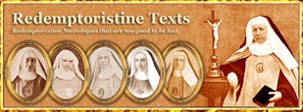
.jpg)









